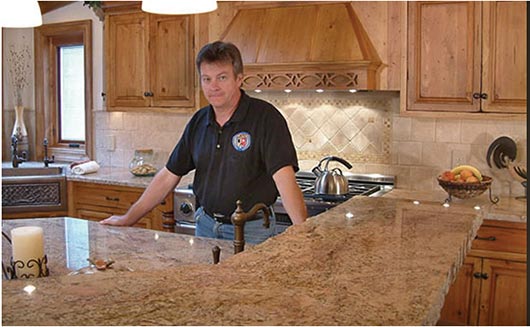Does Your Countertop Need Sunscreen?
Frederick M. Hueston, PhD
Stone Care Consultant
 If you have granite or quartz (engineered stone) tops that are exposed to UV light, you may need to take some preventive steps to keep it protected from fading.
If you have granite or quartz (engineered stone) tops that are exposed to UV light, you may need to take some preventive steps to keep it protected from fading.
Over the past few years, my firm has been called in to investigate several problems with both stone and quartz materials. The following are some examples of these problems:
Case #1: A customer had a tropical green granite bar installed on their pool deck. Shortly after installation the countertop started to get darker and darker.
Case #2: A granite top was installed next to a barbecue pit. Several months after it was installed it developed a crack. The fabricator replaced the piece and it again cracked after being installed. The fabricator again replaced the granite, but this time with a different type of granite. It also cracked.
Case #3: A quartz table was fabricated and placed on a outdoor pool deck. After one summer the table began to develop spider cracks all over the top surface.
Case #4: An outdoor granite bar started having a sticky residue appear on the surface. It could be removed with acetone but it kept coming back.
Case #5: A red quartz countertop was installed on an outside bar and within three months it turned pink.
Case #6: A fabricator profiled a piece of stone, polished it and noted that the profile was lighter or a different color than the top surface.
All of these failures are the result of exposure to UV light.
How does UV light work?
(Wikipedia) Ultraviolet (UV) light is electromagnetic radiation with a wavelength shorter than that of visible light, but longer than x-rays, in the range 10 nm to 400 nm, and energies from 3 eV to 124 eV. It is so named because the spectrum consists of electromagnetic waves with frequencies higher than those that humans identify as the color violet.
UV light is found in sunlight and is emitted by electric arcs and specialized lights such as black lights. As an ionizing radiation it can cause chemical reactions, and causes many substances to glow or fluoresce. Most people are aware of the effects of UV through the painful condition of sunburn, but the UV spectrum has many other effects, both beneficial and damaging, on human health.
Now, what this means is that UV light is nasty and can break down almost any material. If you place a PVC pipe in the back yard over the summer, then take a hammer to it you will find that it has become brittle. Another example is how your car’s paint will fade over time.
UV light is very destructive to almost all polymers. The process is known as polymer degradation. This is why many plastics have UV absorbers which will inhibit UV degradation.
If you know anything about quartz surfaces and granite resining you will know that they are made with and impregnated with polymers such as polyesters and epoxies. Many of these polymers do not contain UV absorbers and for this reason the UV light will degrade the polymers leading to cracking, fading and ultimately, complete breakdown. I have even seen UV degradation occur indoors where a countertop is exposed to sunlight. Glass will protect and reduce some UV rays but not all.
So how do you prevent these failures?
If you are considering having a stone or quartz outdoor cooktop, bar, etc. installed, ask the manufacturer or fabricator if their material can be used outdoors. Many will say no. Be sure to ask if the stone is resined. If it is, consider requesting a non-resined granite. Keep in mind that non-resined natural stone will also fade naturally but it generally takes years for fading to occur.
As technology develops you may find improvements in resin technology, which might overcome or at least slow the effects of UV degradation.
For existing countertops, etc. I would advise you to keep them covered with a breathable fabric when not in use. This will shade them from the UV rays. You may also consider having tinted plastic glass cut to size and placed on the tops when not in use. I haven’t tried applying sunscreen, and would not recommend it. (LOL)
If you are unsure if your granite is resined or not, there is a test kit available that can tell you. You can find out more about this kit from Dr. Fred’s website, www.drfredsinnovativesolutions.com, or call toll Braxton-Bragg toll free, 800-575-4401
Frederick M. Hueston has written over 33 books on stone and tile installations, fabrication and restoration and also serves as an expert for many legal cases across the world. Send your comments to him at fhueston@stoneforensics.com .